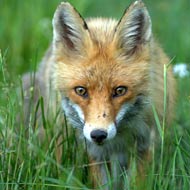
Proposals would mirror Scottish practices
MPs may be asked to vote on changing the fox hunting laws in England and Wales as early as next week, according to reports.
Defra has revealed 'a small number of technical amendments' have been proposed, to align hunting legislation in England and Wales with that of Scotland.
The amendments to the Hunting Act would allow the use of more dogs to flush out foxes before shooting. Currently, only two are allowed for pest control purposes.
In Scotland, however, an unlimited number of dogs can be used to flush out wild animals in this way.
A statement released by Defra said: "This is important in upland areas where the current limit of using two dogs across large and often wooded areas is not regarded as effective or practical for pest control purposes."
The timing of the vote has yet not been confirmed.
Responding to the news, the RSPCA said: "Weakening the Hunting Act in this way will most likely result in the reintroduction of fox hunting into modern life.
“The use of a statutory instrument to appease a few who can’t enjoy hunting without a kill would not only mean a return to cruelty but it also flies in the face of the original will of Parliament and the views of the majority of the general public...
“Other blood sports such as dog and cockfighting have been consigned to history - why should fox hunting be treated any differently?
"Over the ten years it has been in force the Act and has already proven to be a useful piece of the legislative framework protecting wildlife in England and Wales."
Defra says the current restriction that only one dog can be used to stalk or flush out an animal underground will remain in place.
According to BBC News, a spokeswoman said the government remains committed to giving MPs a vote on repealing the Hunting Act entirely, which was promised in the Conservatives' manifesto.



 The Greyhound Board of Great Britain has published new vaccination guidance, with all greyhounds registered from 1 January, 2027 required to have the L4 leptospirosis vaccination, rather than L2.
The Greyhound Board of Great Britain has published new vaccination guidance, with all greyhounds registered from 1 January, 2027 required to have the L4 leptospirosis vaccination, rather than L2.